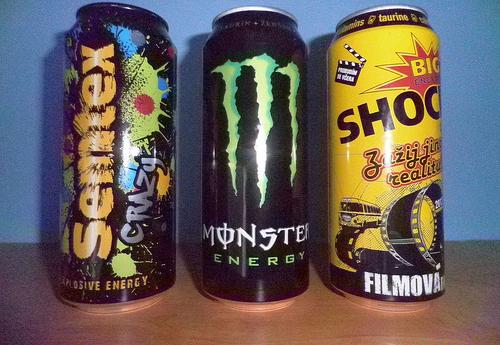High energy comes with high risks
George Mason University dining is buzzing about the health risks from energy drinks.
Mason Dining’s Registered Dietitian Lois Durant hosted an event on Feb. 25 discouraging students from over-consuming energy drinks. The event acknowledged the health risks of energy drinks such as Red Bull, 5-hour Energy and Monster for the students who consume them.
Because energy drinks are most popular among young adults, Durant believes it is important to warn Mason students of these health risks.
“Energy drinks are often in the media, [addressing] death [and] heart irregularities, which seems to be on the rise on college campuses,” Durant said.
Energy drinks are offered on campus at the General Store, One-Stop, Second Stop and in vending machines.
In an effort to inform Mason students about health risks of energy drinks, Durant and Kathy Sanchez, a food and nutrition student, set up an educational table at Southside. To engage students, they used their interactive spin wheel, each section of which asked different questions about energy drinks.
According to one of the spin wheel’s facts, almost one in five students report having heart palpitations after drinking energy drinks. Another fact explained that guarana, a common energy drink ingredient, contains caffeine.
Durant believes students might be surprised to learn that guarana contains caffeine. Most energy drinks already have caffeine as a listed ingredient, guarana, however, supplies more caffeine that is not always acknowledged on the nutrition facts label.
According to Sanchez’s research, another harmful ingredient in energy drinks is taurine. Taurine has the potential to increase the effects of bi-polar disorders. Taurine reacts with the prescription drug Lithium, which can decrease Lithium’s effectiveness and cause temporary mental instability.
In addition to discouraging the abuse of energy drinks, Durant and Sanchez provided healthy suggestions to alternative sources for energy.
Durant and Sanchez recommend regular exercise, 15-20 minute power naps, hydration control and the consumption of natural fructose, found in fresh fruits and protein foods, such as eggs, meat and beans, for extra energy.
Senior Helena Michel believes these alternative energy sources have worked best for her.
“I have found that I have more energy throughout the day when I carry my water bottle with me and drink it throughout the day,” Michel said. “I don’t use energy drinks.”
Although Durant and Sanchez don’t endorse energy drinks, there is a demand for them on campus. Durant hopes providing students with knowledge about energy drinks will, at least, better inform students to make conscious decisions about their intake.

